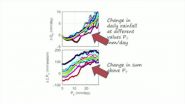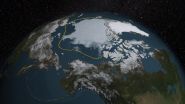The saying 'It never rains but it pours' is truer than ever in Scotland
Says new research into how our climate is changing
2015-09-16
(Press-News.org) New research at the University of Warwick with colleagues from the London School of Economics has identified changes in the shape of rainfall across Europe; changes in the amount of drizzle compared with downpours and everything in-between.
Professor Sandra Chapman of the University of Warwick and co-authors Professor Nicholas Watkins and Dr David Stainforth from the London School of Economics have today published new research demonstrating how the variability in the way it rains makes it intrinsically difficult to identify the character of local climate change. Difficult but not impossible. In places such as Scotland, the Dordogne, Tuscany and the Low Countries, changes are evident despite the variability. The research team have looked at 63 years' worth of European rainfall data and found location-specific changes in the character of rainfall that are sometimes big enough to pick out directly from the local observations.
Sandra Chapman from the University of Warwick said:
"We have found that in many places in Scotland the rain on heavy rainfall days has increased by over 50%. However, in some places in the Highlands this rain has shifted from light rain days so overall it's not much wetter but when it does rain it is more intense. In other Scottish locations the change reflects an increase in the total amount of rain and snow overall. For all these areas of Scotland the old adage "It never rains but it pours" has become truer than ever.
"We have also found related results across Europe. In south west France it is drier with less rain on all types of rainy days but in Tuscany it is drier with heavy rainfall in particular being reduced."
Nicholas Watkins from the London School of Economics and the University of Warwick said:
"Knowing the change in average rainfall is not enough to understand the change in intense rainfall. In fact changes in variability often have a greater impact on extremes.
"The research demonstrates how rainfall variability - in particular what is known as the "long tail" of rainfall distributions - makes it hard to identify changes just by looking at local observations. Even when we create data where changes are known to exist they can sometimes be impossible to identify because there aren't many days in a season. So just looking out your window - even if you do it every day and keep a careful log - can create a misleading impression about local climate change. Our method quantities this uncertainty directly from the observations; we can identify when we know things are changing, when we know things are not changing, and when we know that the data cannot tell us whether things are changing or not.
David Stainforth from the London School of Economics said:
"This work demonstrates how the impacts of climate change are complicated and local. As a consequence it is likely that individuals will have different perspectives on anthropogenic climate change if their views are based mainly on personal experiences of weather rather than on the underlying fundamental science."
"This study, and an earlier related one on temperature differences by the same team, provides a new source of information to support local decisions made in the context of climate change; decisions relating to flood protection, insurance, water provision, agricultural planning or even just what will grow best in your garden."
INFORMATION:
The research is presented in the paper Limits to the quantification of local climate change, by S. C. Chapman, D. A. Stainforth, and N. W. Watkins published in the journal Environmental Research Letters on 16th September 2015.
Note for editors:
Citation:
Chapman et al 2015 Limits to the quantification of local climate change Environ. Res. Lett. 10 094018.
DOI: 10.1088/1748-9326/10/9/094018
Link: http://iopscience.iop.org/1748-9326/10/9/094018
No climate models are used in the analysis so the results are not subject to the debates regarding the reliability of such models on local scales.
The researchers acknowledge the E-OBS dataset from the EU-FP6 project, the EPSRC's CliMathNet and NetworkPlus EP/K000632/1 and KLIMAFORSK 229754.
S.C.C and N.W.W acknowledge the Max Planck Institute for the Physics of Complex Systems visitor programme.
The Grantham Research Institute on Climate Change and the Environment was launched at the London School of Economics and Political Science in October 2008. It is funded by The Grantham Foundation for the Protection of the Environment.
The ESRC Centre for Climate Change Economics and Policy is hosted by the University of Leeds and the London School of Economics and Political Science. It is funded by the UK Economic and Social Research Council. The Centre's mission is to advance public and private action on climate change through rigorous, innovative research.
[Attachments] See images for this press release:

ELSE PRESS RELEASES FROM THIS DATE:
2015-09-16
HANOVER, N.H. - Warming temperatures are causing Arctic mosquitoes to grow faster and emerge earlier, significantly boosting their population and threatening the caribou they feast on, a Dartmouth College study finds.
The study predicts the mosquitoes' probability of surviving and emerging as adults will increase by more than 50 percent if Arctic temperatures rise 2 °C. The findings are important because changes in the timing and intensity of their emergence affect their role as swarming pests of people and wildlife, as pollinators of tundra plants and as food for ...
2015-09-16
A total ban on trans fatty acids (trans fats) in processed foods in England could potentially prevent or postpone about 7,200 deaths from coronary heart disease over the next five years, suggest experts in The BMJ this week.
They say a total ban in England is "technically feasible" and they call for "decisive action" to prioritise the most effective and cost effective policy options.
Industrial trans fatty acids are produced from plant oils (a process known as hydrogenation) and are commonly added to processed foods to cheaply improve shelf life and palatability.
Higher ...
2015-09-16
Public Health England (PHE) recently endorsed the use of electronic cigarettes as an aid to quitting smoking. But in The BMJ this week, experts question the evidence on safety and effectiveness underpinning the recommendations.
Professor Martin McKee at the London School of Hygiene & Tropical Medicine and Professor Simon Capewell at the University of Liverpool, argue that the available evidence about e-cigarettes "suggests that the debate is far from over and questions remain about their benefits and harms."
The PHE report concludes that e-cigarettes are much safer ...
2015-09-16
The reason why middle class people are more likely to play music, paint and act has been revealed in a major new study.
Research involving 78,000 people found that it was not wealth or social status that were strongly linked to people taking part in arts activities as amateurs or professionals.
Instead, it was the level of education that lay behind arts participation, the study by Dr Aaron Reeves, a sociologist at the University of Oxford, found.
In an article in the journal Sociology, Dr Reeves said that of the 78,011 surveyed, 18% had taken part in painting or ...
2015-09-16
A study of 6467 children from England--presented at this year's annual meeting of the European Association for the Study of Diabetes (EASD) in Stockholm--shows that no access to a garden at age 3-5 years is linked to an increased risk developing obesity by age 7 years. The research is by Annemarie Schalkwijk, VU University Medical Centre, Amsterdam, the Netherlands, and colleagues.
Overweight and obese children are at increased risk of becoming overweight and obese adults and therefore being overweight or obese in childhood is an important risk factor for developing ...
2015-09-16
A meta-analysis of 21 studies presented at this year's annual meeting the European Association for the Study of Diabetes (EASD) shows that exposure to pesticides is associated with increased risk of developing diabetes by 61%, with different types of pesticides showing varying levels of risk. The study is by Giorgos Ntritsos, University of Ioannina, Greece, and Dr Ioanna Tzoulaki and Dr Evangelos Evangelou, Imperial College London, UK, and colleagues.
How diabetes develops is considered to be an interplay between genetic and environmental factors. Emerging evidence suggests ...
2015-09-16
New research presented at this year's annual meeting of the European Association for the Study of Diabetes in Stockholm shows that a 10-times increased exposure to organic pollutants in early pregnancy is associated with a 4.4 times increased risk of a pregnant woman developing gestational diabetes. The research is by Assistant Professor Leda Chatzi, University of Crete, Heraklion, Greece.
Persistent Organic Pollutants (POPs) are a group of diverse substances, including polychlorinated biphenyls (PCBs) and organochlorine pesticides that are resistant to biodegradation ...
2015-09-15
On Sept. 13, 2015, the Solar and Heliospheric Observatory -- a joint project of the European Space Agency and NASA -- discovered its 3,000th comet, cementing its standing as the greatest comet finder of all time. Prior to the 1995 launch of the observatory, commonly known as SOHO, only a dozen or so comets had ever even been discovered from space, while some 900 had been discovered from the ground.
The 3,000th comet was originally spotted in the data by Worachate Boonplod, of Samut Songkhram, Thailand.
"I am very happy to be part of a great milestone for SOHO's comet ...
2015-09-15
UNIVERSITY PARK, Pa. -- Asking just two questions may be able to help nurses and doctors quickly and easily identify delirium in hospitalized older adults, according to health researchers.
Delirium is a reversible cognitive condition that can be resolved if caught and treated early.
"Delirium can be very costly and deadly -- and with high-risk patients, time matters," said Donna M. Fick, Distinguished Professor of Nursing and co-director of the Hartford Center of Geriatric Nursing Excellence at Penn State. "Our ultra-brief two-item bedside test for delirium takes an ...
2015-09-15
According to a NASA analysis of satellite data, the 2015 Arctic sea ice minimum extent is the fourth lowest on record since observations from space began.
The analysis by NASA and the NASA-supported National Snow and Ice Data Center (NSIDC) at the University of Colorado at Boulder showed the annual minimum extent was 1.70 million square miles (4.41 million square kilometers) on Sept. 11. This year's minimum is 699,000 square miles (1.81 million square kilometers) lower than the 1981-2010 average.
Arctic sea ice cover, made of frozen seawater that floats on top of the ...
LAST 30 PRESS RELEASES:
[Press-News.org] The saying 'It never rains but it pours' is truer than ever in Scotland
Says new research into how our climate is changing



